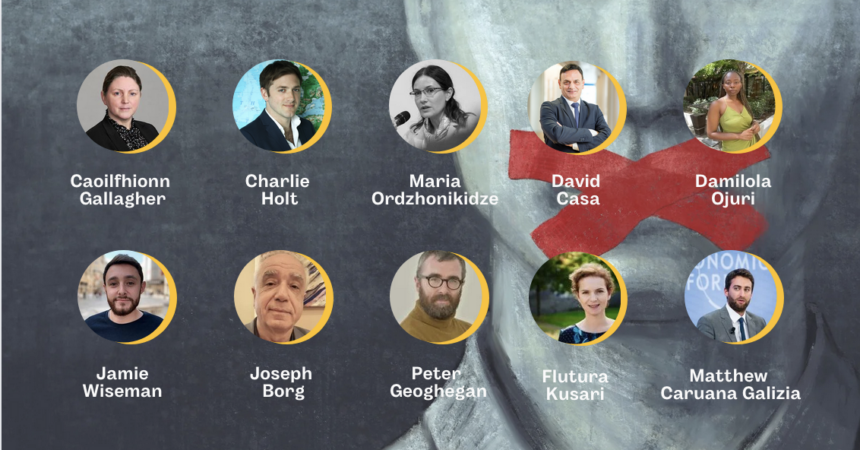A conference organised by The Shift and supported by the Justice for Journalists Foundation (JFJF) will bring together international and local legal experts and members of the media community to discuss how SLAPPs and other legal methods are used to harass journalists and how this directly impacts the information they provide to the public.
The half-day conference, entitled “Silencing Freedom. Weaponising the Law.” will be held on the 27 October at the Westin Dragonara Resort, and attendance is open to the public following registration.
Strategic Lawsuits Against Public Participation (SLAPPs) are a specific form of harassment used primarily against journalists and human rights defenders to prevent or penalise those speaking up on issues of public interest.
The conference objectives are to inform the public and media community about identifying forms of legal harassment and to create a support network by sharing resources and solutions.
Panellists speaking at the event include international stakeholders in politics, media freedom, human rights, and journalism and bring together a broad range of experience and expertise that will be discussed throughout two sessions.
The debate will delve into the evolving nature and definitions of SLAPPs, their impact on journalists’ daily work, and the tools developed to fight against them.
Moreover, the conference will review the legislative changes at the EU level and assess whether they provide enough protection to journalists against legal harassment.
At the time of her assassination, Daphne Caruana Galizia faced 43 civil and five criminal libel suits. Her family inherited them after her death and continue to fight them.
In May 2017, Ali Sadr Hasheminejad, the owner and chairman of Pilatus Bank, sued Daphne Caruana Galizia in an Arizona court in his and Pilatus Bank’s name. The claim was for US$40,000,000 in damages. Daphne Caruana Galizia never knew about the case filed by Pilatus Bank and Hasheminejad, and it was withdrawn within a day of her assassination.
Shortly after, the threats of SLAPPs against other newsrooms in Malta began, and over the years, several individuals and companies have threatened legal action against The Shift for publishing articles exposing scandals and scams.
These include Henley and Partners, a company involved in Malta’s cash-for-citizenship scheme, Russian banker Ruben Vardanyan, Croatian Kristijan Curavić, the man behind the dubious White Flag ‘environmental’ scheme, and Turab Musayev, the Azeribaijani-British National who was SOCAR Trading’s representative on the Board of Electrogas.
Ram Tumuluri, the former face of the failed concession of three public hospitals in Malta, has also sent a legal threat to The Shift regarding reports about his latest venture in Mumbai.
The European Parliament and the European Commission have been working to address the issue of SLAPPs aimed at silencing independent media and rights defenders. This effort began in 2018 when the parliament invited the Commission to propose an anti-SLAPP Directive.
In July 2023, the European Parliament voted for a more robust anti-SLAPP directive that includes expanded definitions, a broader scope for cross-border cases, and provisions for national registers of anti-SLAPP court decisions. Trilogue negotiations are currently underway.
Nevertheless, even as the EU is in its final stages of establishing anti-SLAPP legislation, governments and state-owned agencies in Europe and elsewhere are becoming increasingly creative in using laws to stifle journalists’ work.
Several studies have identified a global surge in the legal harassment of journalists, which goes beyond SLAPP suits. These include the abuse of national security laws, charging journalists with “cyber libel” and “online hate speech”, accusing journalists of financial crimes such as tax evasion, or, in Malta’s case, abusing the inadequate Freedom of Information Law to tie a small newsroom up in lengthy in court proceedings.
The most recent report by CASE Coalition found Malta to have the most SLAPPs per Capita two years in a row.
Out of 47 European countries analysed by the Coalition Against SLAPPs in Europe (CASE), Malta has, by far, the highest number of Strategic Lawsuits Against Public Participation (SLAPPs) per capita. The development was due to the government’s multiple court challenges against 40 Freedom of Information requests filed by The Shift.
Even as The Shift wins the court cases, these have nevertheless diverted the newsroom’s time, money, and attention from working on stories in the public interest.
Registrations for the conference are open. The conference agenda can be viewed here, and the panellists’ biographies can be found here.












